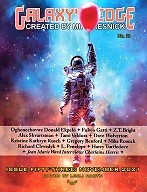 Galaxy’s Edge #53, November/December 2021
Galaxy’s Edge #53, November/December 2021
“The Measure of a Mother’s Love” by Z. T. Bright
“O2 Arena” by Oghenechovwe Donald Ekpeki
“Winter Solstice” by Mike Resnick (Reprint, not reviewed)
“The Going Rate” by Alex Shvartsman
“To Heaven and Back Again” by Tami Veldura
“Substitutions” by Kristine Kathryn Rusch (Reprint, not reviewed)
“Who Smiles Last” by Fulvio Gatti
“My Favorite Christmas” by Dave Wolverton (Reprint, not reviewed)
“Yang Feng Presents: The Algorithm of Everything” by Dhew (translated by Ron)
Reviewed by Kevin P Hallett
This 53rd issue of Galaxy’s Edge contains six original stories, including one novelette and one translation. In addition, this issue includes three fascinating stories that were previously published. As has been its long standing custom, Tangent Online does not review previously published works.
“The Measure of a Mother’s Love” by Z. T. Bright
Climate change has put the planet at death’s door, in this short SF story. And now, humanity has moved people into small orbital pods, allowing them one day on Earth each year. A mother’s son sacrifices his life to build his mother’s pod, leaving her distraught and unable to appreciate his gift or the rarity when an alien chooses to live with her.
In orbit, the mother sees the strange alien stick insect as another son. But after several years, her otherworldly son prepares to leave. And worse, he chooses to go on the day she visits her human son’s grave.
This character-centric story was well-paced and easily pulled on the reader’s heartstrings.
“O2 Arena” by Oghenechovwe Donald Ekpeki
He attends a law school in his native Nigeria in this SF novelette set in the future. Air is no longer free, and money is expressed in units of breathable oxygen. Meaning everyone works to breathe, and every bill costs oxygen, bringing the payer closer to death.
His friend at school has ovarian cancer with a poor prognosis. There are few options for finding enough oxygen units to pay for her treatment unless he fights in the life-or-death O2 Arena.
This story’s predictable ending was a long time coming with prose that too often read more like a history text.
“The Going Rate” by Alex Shvartsman
In this short fantasy, the local HOA snitch is plaguing Karen over the slightest infractions. And she does what any angry resident would; she uses a paperback spell book to summon a demon.
The demon promises her he will impose any hardship on the snitch, provided she pay the going rate. And when Karen hears what the cost is, she thinks of a cunning way to pay the price. But she should have paid closer attention to the small words the demon glossed over.
Author Shvartsman crafted an intriguing piece of whimsical fantasy for the reader to enjoy.
“To Heaven and Back Again” by Tami Veldura
Meleny and Konsta are fleeing from an English imperial spaceship in this SF short. Set in a juxtaposed future with spaceships, royal courts, and sword-toting warriors, Meleny is wanted because she insulted the English Court, and they will execute her if they catch her.
Ahead lie twin moons and a chance to dodge the pursuers in the gravity wells. However, these moons are not devoid of life.
This was a melodramatic space opera coupled with a simple ending.
“Who Smiles Last” by Fulvio Gatti
Gatti’s SF short begins with Carlo accepting his degree while still a young child. He is a genius cursed with no ability to show facial expressions. And all the trust and empathy that comes from a simple smile is denied Carlo. So, he throws himself into developing prosthetics to help others.
His mother alone accepts him for what he is, and the reactions of others drive him down. He needs a prosthetic face, but that isn’t possible. And then someone unwittingly helps him.
This story was an engaging look at the importance of something as simple as a facial expression and the bigotry found in the world.
“Yang Feng Presents: The Algorithm of Everything” by Dhew (translated by Ron)
The developers of the world begin creating new self-teaching algorithms in this short SF. They first create one to predict today’s weather, then it’s expanded to predict the weather for the next quarter.
Soon the pressure is on to develop one for forecasting and then influencing shoppers and even voters. Finally, programmers wonder if there is a limit to what they can write into an algorithm. And the secret project to create an algorithm of everything is born. But what kind of questions should it answer?
The story may have a high appeal among geek readers; it took time to poke fun at the world’s nerds.